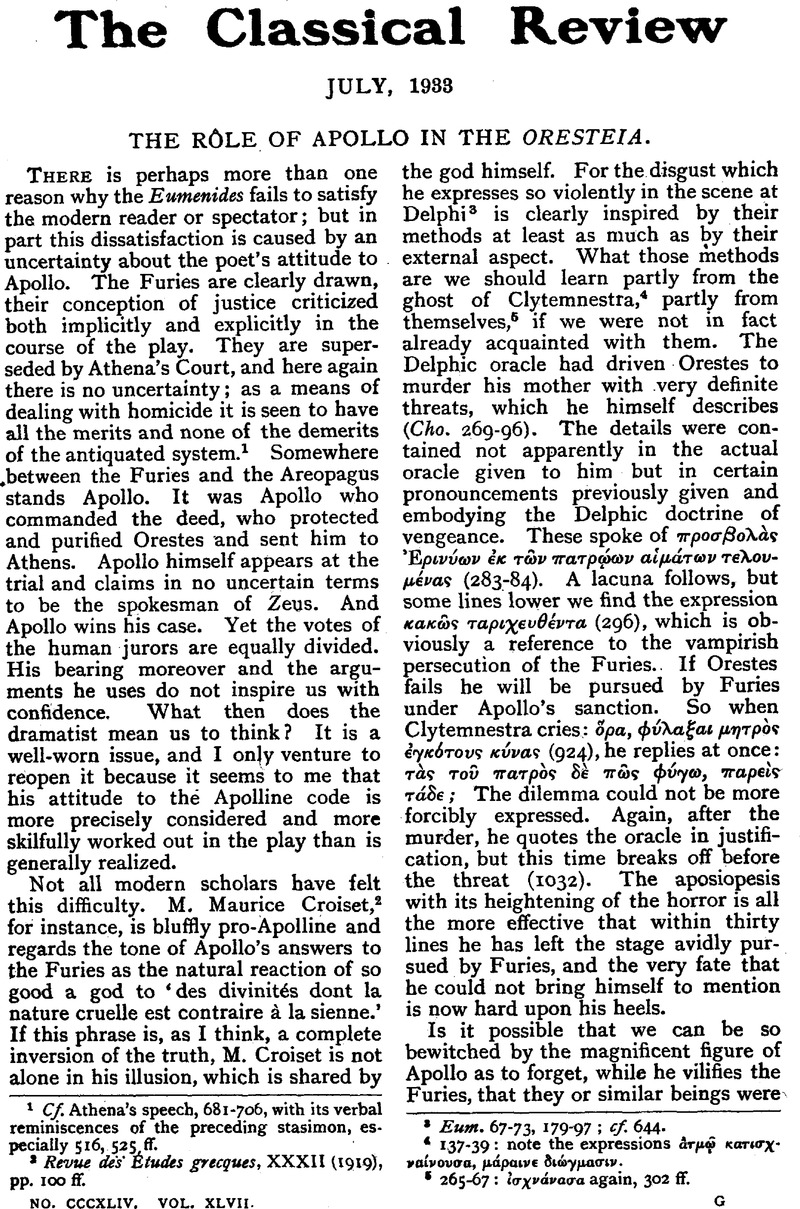Article contents
The Rôle of Apollo in the Oresteia
Published online by Cambridge University Press: 27 October 2009
Abstract

- Type
- Review Article
- Information
- Copyright
- Copyright © The Classical Association 1933
References
page 97 note 1 Cf. Athena's speech, 681–706, with its verbal reminiscences of the preceding stasimon, especially 516, 525 ff.
page 97 note 2 Revue des Études grecgues, XXXII (1919), pp. 100 ff.
page 97 note 3 Eum. 67–73,, 179–97; cf. 644.
page 97 note 4 137–39: note the expressions ⋯γμῷ κατισχ να⋯νουσα, μ⋯ραινε διώγμασιν.
page 97 note 5 265–39: ⋯σχν⋯νασα again, 302 ff.
page 98 note 1 See p. 104.
page 98 note 2 The allusions to Apollo in the Agamemnon deserve a fuller study than space will here allow, and most of them have a forward remeraence. Briefly, in men's hopes he is the Healer (146, 512; cf. Eum. 62), in his actions the Destroyer, of the Greeks at Troy (510–11) and, in a twofold sense, of Qassandra (e.g. 1082). Note the horrified question of the Chorus at 1204. The god can hardly be said to be presented in a favourable light.
page 99 note 1 The metaphors of the snake and the net are closely associated; both the π λεκτα⋯ κα⋯ σπειρ⋯μαγα of 248 and the βρ⋯χοσ of 557 are references to the actual μηχ⋯νημα (98I) which Clytemnestra used.
page 99 note 2 306–14: note especially Μοῖραυ, Δι⋯θεν, δ⋯καιον, Δ⋯κη.
page 99 note 3 This is the usual interpretation of a corrupt text; but Wilamowitz, Aischylos, Orestie II, p. 330, points out difficulties in it, and in Aischylos, Interprelationen, pp. 211–3, he takes ‘the dweller in the στ⋯μον to be Apollon Agyieus.
page 99 note 4 931.
page 100 note 1 925. Cf. p. 97 of this article.
page 100 note 2 260–63. Orestes wishes to be ὑπ⋯δικος, but for them there is no case to try.
page 100 note 3 But the text is conjectural, and ⋯τελειαν and ⋯γκρισιν are much debated.
page 100 note 4 Cf. 28, and Agam. 973.
page 100 note 5 Cf. 150, 162, 172 (παλαυγενεῖς μο⋯ρας), 333 ff. (Μοῖρα), 346, 390–96, 731. 778–79.
page 101 note 1 See Wilamowitz, , Orestie II, p. 26Google Scholar. This article owes much to his brilliant Introduction to the Choephoroe.
page 102 note 1 E.g. Cho. 1070 ff. (the servants are plus royalistes gue le roi); compare Apollo in Eum. 625–37. It may be objected that there is little reason to suppose that women were more honoured at Athens than in Dorian Greece. The evidence is scanty and hard to evaluate; it can scarcely be discussed here. But certainly the mother would tend to gain in dignity what the head of the family lost, and.such an argument as Apollo's would carry less conviction at Athens. See Wilamowitz, op. cit. p. 29 ff. If the women of Sparta were honoured for bearing noble sons, they were at any rate allowed to have little to do with their education.
page 104 note 1 Cf. 5 (θελο⋯σης οὐδ⋯ πρ⋯ς β⋯αν τιν⋯ς), 7 (γεν⋯θλιον δ⋯σιν).
page 104 note 2 N.B. especially Cho. 147–48, 394–99.
- 2
- Cited by


